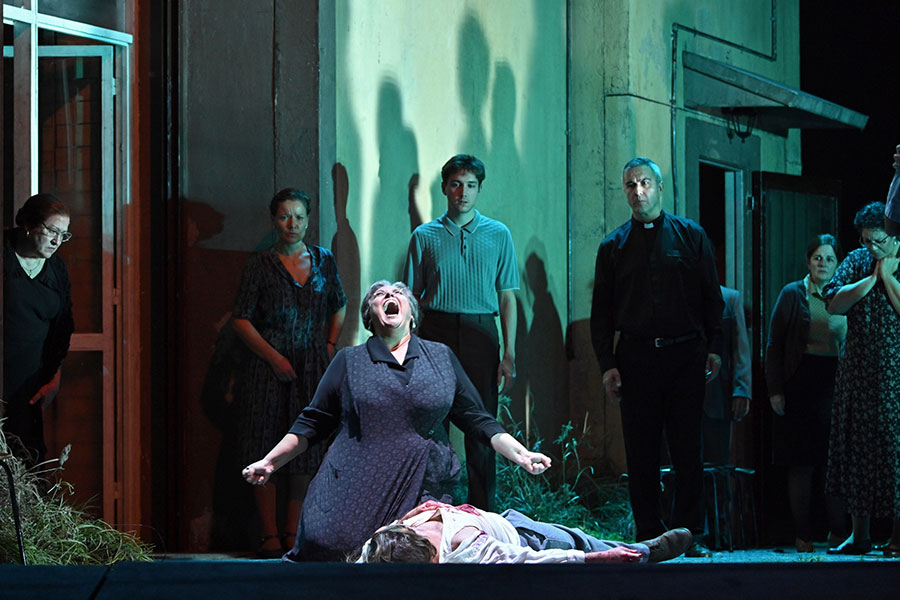El Gran Teatre del Liceu estrena el premiado doble programa de Cavalleria rusticana & Pagliacci

La producción merecedora en 2016 del Premio Laurence Olivier al mejor espectáculo operístico, llega al escenario del Gran Teatre del Liceu con la dirección escénica de Damiano Michieletto, la dirección musical de Henrik Nánási y las mejores voces del repertorio verista.
Los dos títulos más emblemáticos del verismo, Cavalleria rusticana de Mascagni y Pagliacci de Leoncavallo, llegan al Gran Teatre del Liceu del 5 al 22 de diciembre después de ganar el Premio Laurence Olivier al mejor espectáculo operístico de 2016. Uno de los directores de escena más cotizados del momento, Damiano Michieletto, firma esta producción deslumbrante que ha dejado huella en el público de la Royal Opera House y que ahora llega a Barcelona bajo la batuta de Henrik Nánási y con la participación de la Orquesta Sinfónica y el Coro del Liceu, que además de contar esta vez con 85 miembros, también se acompañará del conjunto VEUS – Cor infantil Amics de la Unió.
Uno de los cantantes más carismáticos y precisos de este siglo, el tenor francés Roberto Alagna, vuelve al Liceu después de seis años de ausencia para enfrentarse a un auténtico tour de force: cantar en una misma sesión los roles protagonistas de Turiddu y Canio. También regresan voces de primer nivel internacional como las del tenor argentino Marcelo Álvarez, que sustituye a Fabio Sartori en el rol de Canio, o la de la soprano polaca Aleksandra Kurzak en el rol de Nedda. Este doble programa también será una oportunidad para escuchar por primera vez en Barcelona las voces de dos de las más demandadas sopranos del momento, Elena Pankratova y Oksana Dyka, que se alternarán en el rol de Santuzza. Otros nombres destacados del panorama internacional como Teodor Ilincai, Martin Muehle, Gabriele Viviani, Àngel Òdena o Mercedes Gancedo, entre otros, completan el reparto.

Cavalleria rusticana & Pagliacci , Gran Teatre del Liceu 2019 © A. Bofill
La tradición ha establecido que, en los teatros, Cavalleria rusticana y Pagliacci se representen seguidas. Damiano Michieletto ha querido ir más allá y entrelazarlas “como si fueran dos capítulos de una misma historia”, de tal forma que incluso vemos personajes de Pagliacci apareciendo dentro de la trama de Cavalleria rusticana o personajes de esta última todavía rondando por el escenario mientras comienza la segunda ópera. Michieletto encuentra muchos puntos en común entre ambos títulos: desde la localización, el sur de Italia, hasta “los celos, el asesinato, la venganza, la religión, la presencia del coro, la voz desplegada y apasionada…”.
Las historias de las dos óperas son crueles y dominadas por una pulsión visceral, pero también son habituales, humanas y en cierta medida cotidianas. El verismo aspira a representar la vida tal como es en los estratos sociales más bajos. Así, Pagliacci es la historia de una compañía de cómicos que va por los pueblos del sur de Italia, con una infidelidad descubierta por azar que acaba en un doloroso asesinato sobre el escenario, mientras que Cavalleria rusticana es otra historia de infidelidades tras la densa sombra moral de la religión que acaba con un duelo de honor a cuchilladas.

Cavalleria rusticana & Pagliacci , Gran Teatre del Liceu 2019 © A. Bofill
El director musical Henrik Nánási afronta dos obras con introducciones sublimes, intermezzi memorables, duetos grandiosos y un aria espléndida por ópera. De Cavalleria rusticana destacan especialmente el dueto de tenor y soprano interpretado por Turiddu y Santuzza en el primer acto, “Ah! Lo vedi”, el auténtico clímax de la ópera, o también el intermezzo, el fragmento más popular. En Pagliacci los momentos más memorables son sin duda el prólogo “Si può? Si può?” y el aria de Canio “Vesti la giubba”, una de las arias más conocidas de todo el repertorio.
Cavalleria rusticana es una ópera en un acto con música de Pietro Mascagni y libreto de Giovanni Targioni y Guido Menasci. Se estrenó por primera vez el 17 de mayo de 1890 en el Teatro Costanzi de Roma. En Barcelona llegaría un año más tarde, el 9 de mayo de 1891, al Liceu, donde se ha representado un total de 107 veces, siendo la última el 20 de abril de 2011. Pagliacci es una ópera en dos actos con libreto y música de Ruggero Leoncavallo que se estrenó el 21 de mayo de 1892 en el Teatro Dal Verme de Milà. 3 años más tarde llegaría a Barcelona, también al Liceu, el 25 de enero de 1895, donde se ha representado en 104 ocasiones.





